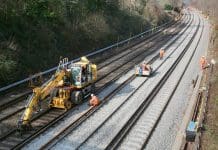After a Conservative Party Conference dogged by the apparent open secret of plans to axe the HS2 to Manchester link, Rishi Sunak confirmed the rumours in his address
The funding from the HS2 to Manchester axing will allegedly go towards other transport projects in the north of England, in part of a “Network North”.
The Network North would integrate Bradford, Sheffield and Hull with Manchester and Leeds in a “fully electrified line”.
The prime minister said there must be accountability for “mismanagement” at the Euston Station site
Sunak said that the Euston Station project will now be taken over from HS2 management and repurposed for “building new homes, business opportunities and a station”. The £6.5bn savings made from this project will allegedly be redistributed to projects across the rest of the country.
Stating that “east-west links are more important than north-south ones”, the prime minister announced a raft of infrastructure schemes in place of the HS2 to Manchester link, including over 70 road schemes: “We’ll protect the £12bn to link up Manchester and Liverpool as planned, and we’ll engage with local leaders on how best to deliver that scheme.
“We’ll build the Midlands rail hub connecting 50 different stations, we’ll help Andy Street extend the West Midlands metro, we’ll build the Leeds tram, we’ll electrify the North Wales mainline, upgrade the A1, the A2, A5 the M6…”
HS2 will now only reach Birmingham- not even Crewe
In London, the high-speed track will be extended from Old Oak Common in west London to Euston.
Passengers would then have to switch on the existing West Coast Mainline track to travel to Manchester by rail.
This means that passengers can get on a train at Euston and travel to Birmingham on a high-speed railway, before the train will switch to the existing West Coast Mainline track to travel to Manchester.
Industry reactions to the HS2 to Manchester axing
Mark Reynolds, Mace Group chairman and CEO, said:
“HS2 will not deliver the growth and capacity we need without it terminating in central London – and so it is positive news for the country and the industry that the Prime Minister has committed once again to build the new station at Euston, working with the private sector to find a solution that works for everyone.
“His proposed Euston business and development zone may work, but the detail will be critical. We know there is a deliverable and cost-effective solution to Euston Station that can be built within the existing budget, allowing the station to open much earlier; enabling housing and placemaking to be offered sooner; and most importantly that delivers the best value to the taxpayer.
“We look forward to working with the Government to bring those proposals forward. It is important that we push on ahead with delivering the station at speed, providing clarity to industry on the pipeline of work and avoiding further disruption to the local community.
He continued: “Conversely, the decision to not build new high-speed rail north of Birmingham to Manchester will seriously undermine business and investor confidence in the UK and our ability to deliver on our promises – as well as having a chilling effect on the UK’s construction industry.
“The use of the expected £36bn saving to create Network North instead is a bold statement, and we look forward to seeing the detail of the hundreds of planned new rail and road projects. It is now more important than ever that Government release an updated Infrastructure and Construction Pipeline to give confidence to investors and allow the sector to plan and invest in jobs, skills and equipment to meet the announced demand.”
Paul Hamer, CEO, Sir Robert McAlpine said:
“If we hope to build affordable infrastructure that offers value to the UK and stimulates economic and social growth, we need to take a longer-term view on infrastructure investment. With HS2 prized as the UK’s flagship levelling up project, it’s disappointing that the economic and political climate has deterred this ambitious project to improve and rebalance the overall economic health of the country from inception to completion.
“Infrastructure is one of the key pillars of economic longevity and improvement. Whilst it is promising for industry and the country to see the alternative infrastructure investments proposed, proposals must now be accompanied by robust delivery plans to ensure intentions are viable and we are still building towards a better future, rather than taking a step back.”
“The lesson from today’s announcement on HS2 is the UK must change how it approaches planning and delivering infrastructure.”
The Institution of Civil Engineers’ director of policy, Chris Richards said: “The stop/start approach the country takes to major infrastructure benefits no one. We need long-term plans, supported by evidence, long-term thinking on financing options, and robust and consistent policy to achieve desired outcomes.
“The Prime Minister outlined several projects and schemes in his speech. Many of these projects aren’t new, and many have been previously caught in this stop/start cycle of decision-making, which drives up costs. This is likely to happen again.
“Changing direction and switching projects delays businesses and communities from benefitting from infrastructure investment. These positive outcomes are how we should be measuring success, not just by lowest cost to deliver.
“The National Infrastructure Commission will publish its second National Infrastructure Assessment in a few weeks. Before politicians rush off to make the same mistakes again on infrastructure, they should pause, look at the Commission’s advice and use this as a long-term plan to prioritise investment and rebuild credibility.”
Leaving 14m northern workers behind
Sean Keyes, managing director of Sutcliffe, summed up the resignation of the construction industry in response to the news, saying it “hasn’t come as any surprise to the construction sector.”
“Nevertheless, it is yet another disregard towards the north. Several hundred million pounds worth of work will be lost due to this cancellation, not to mention the disregard for the 30,000 employees delivering this crucial project, and the countless businesses and investors across the North West that are currently placing their bets on Manchester as a thriving place to invest based on its promise of increased connectivity.
“Over 14m people live in the north, which makes up a huge proportion of the country. The workforce in the north of the country need to be able to fulfil their potential by working on an equal footing with the south and so investment and funding of projects such as HS2 is crucial, in order for the country to reach its potential and not just the south.”
The CIOB raised questions about the proposed reinvestment of HS2 funding
Eddie Tuttle, director of policy, external affairs and research at the Chartered Institute of Building, said: “Long-term infrastructure projects, like HS2, employ large numbers of skilled workers and apprentices and go some way to securing a pipeline of consistent work for the construction sector. It is well recognised that the built environment industry works best when it has certainty in policy making and investment, so we hope the HS2 funding is reinvested into similar projects which will support the upskilling of the construction workforce, particularly in the north of England, where such investment is so vital for the levelling up agenda.
“In a time of economic uncertainty, where we are witnessing supply-chain collapse, it is now more necessary than ever for Government to commit to public sector projects that benefit not only the local workforce and their communities but also the wider economy. Its therefore important Government moves quickly to provide more detail on the plans it now has to improve the transport infrastructure in the north and communicates with the construction sector which will be responsible for delivering them.”
Others asked how property owners already impacted will be compensated
Richard Flenley, partner at Charles Russell Speechlys, said: “Once hailed as the great project to increase connectivity between London, the North and Scotland, the future for HS2 seems bleak after confirmation that Government is pulling the plug on the Northern leg – another blow to the Levelling Up Agenda, and the basis for HS2’s creation in the first place.
“The impact on homeowners and businesses whose properties have been threatened by potential acquisition cannot and must not be forgotten. If the Northern Leg does not proceed, will those adversely impacted to date be compensated?
“To learn that part of the scheme will now be cancelled – after years of property owners feeling stuck in a state of limbo – will leave many feeling that this has all been for nothing.
“Whatever decision is made about HS2’s future and the Levelling Up Agenda, the adverse impact of HS2 has already been felt – and for some, they now won’t see any benefits.
“This calls in to question how “fit for purpose” the law currently is at striking a fair balance between enabling major infrastructure projects and the interests of those business and homeowners who may (or may not) face compulsory acquisition of their properties at some point in the future”.

















